Sustainability: Is CBS talking the talk but not walking the walk?
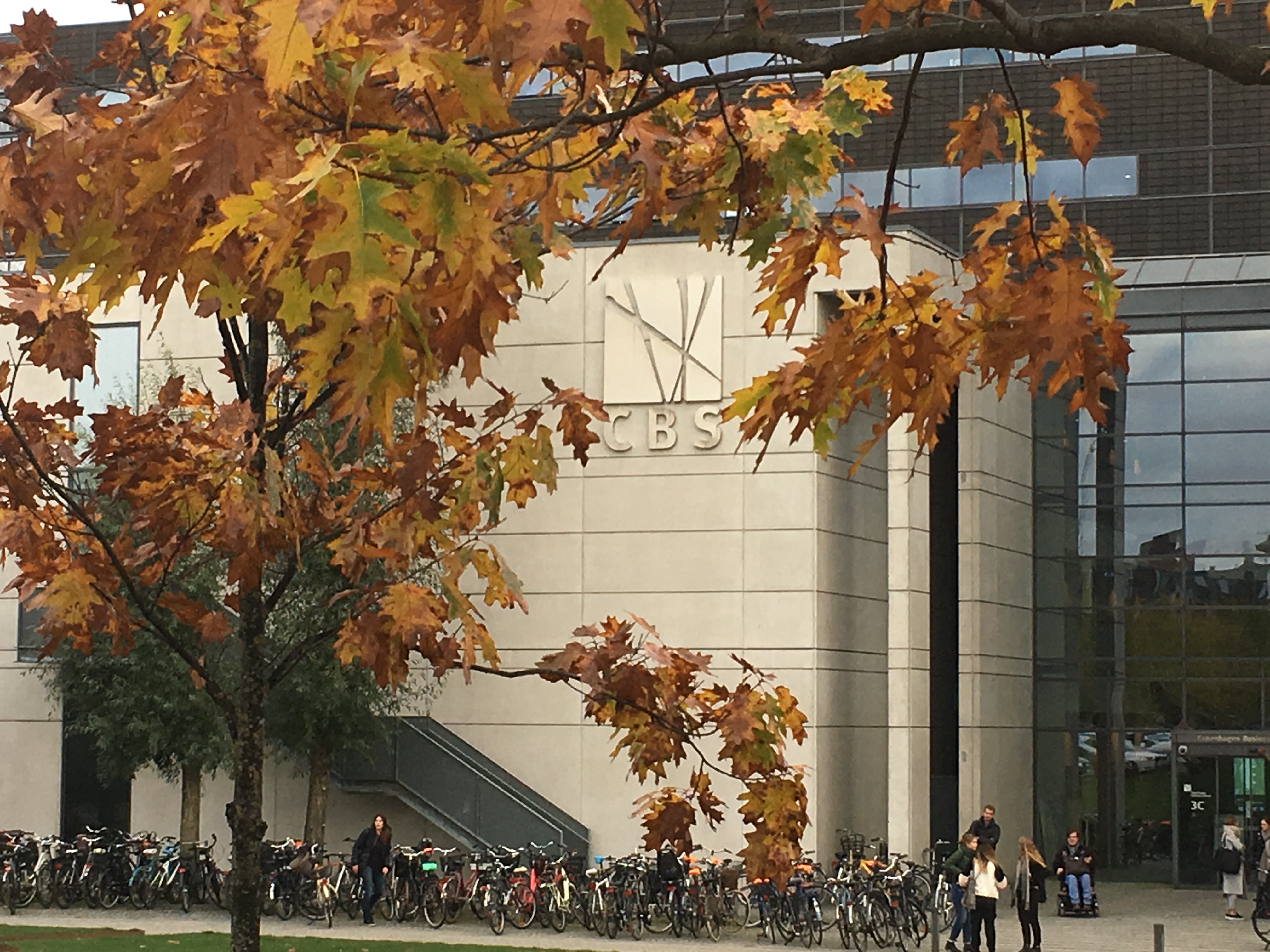
Could CBS do more to be sustainable? (Photo: Anne M. Lykkegaard)
CBS has a copious amount of researchers that are specialists in CSR and sustainable management, and the students are, from day one, told and taught to act responsibly. But CBS does not have an overall strategy about how to be a sustainable university. We asked the University Director why. Staff members working with sustainability and CSR argue that CBS can do much more, and should if they do not want to be blamed for greenwashing.
Trying to figure out what CBS does as a university to act sustainably is not exactly an easy task.
When looking up the word ‘sustainability’ in combination with CBS on google, nothing hardly shows up apart from articles about research and teaching in sustainability at CBS. The same goes for CBS’ intranet, Share.
Finding out exactly how and what CBS is doing in order to limit their CO2-emission or reducing their overall energy consumption is quite a challenge.
Lone Ryevad Boysen, who’s taking an executive MBA at CBS, ran into the same issues when she wanted to gather information for her exam project about the level of sustainability at CBS.
During her project, she was looking for an overall strategy for sustainability. But such a thing does not exist, which she finds strange. The University of Copenhagen has one in which they, for example, aim to reduce their CO2 emission by 65 percent until 2020. (See fact box at the bottom.)
“We conduct research within the fields of CSR and sustainability, we teach and educate students to become responsible managers and leaders, but as a staff member, I lack focus on sustainability or a responsible use of the resources on campus. If we research and teach sustainability, we should live and act it as well,” says Lone Ryevad Boysen, who did her project in connection with the course ‘Leading Responsible Corporations’ and describes the initiatives made at CBS as “scattered”. She is also afraid that CBS could be accused of greenwashing if they do not have a plan.
Louise Kofod Thomsen, the project manager at CBS PRME, which works with responsibility and sustainability in research and teaching, backs up Lone Ryevad Boysen in her points. But we will get back to that.
René Steffensen, Campus Director, explains that Campus Services are working with sustainability and constantly aims to reduce CBS’ overall energy consumption. But CBS does not have a plan for sustainability and has not set any goals for reducing the overall energy consumption.
“Campus Services has sustainability as an important part of their strategy, but at the moment, there doesn’t exist an overall strategy at CBS for sustainability, and we don’t produce annual reports on this. But we do document the progress for internal purposes,” says René Steffensen.
However, he points out that an idea for a project which involves the development of a sustainability strategy has been put into the Campus portfolio for 2018. The new department, CBS Estates, has sustainability as one of its four special areas of focus. But according to “there aren’t any goals or criteria for success until next year,” says René Steffensen.
“In the past years, CBS hasn’t had a big focus on sustainability as a strategic tool, but to me, it seems as if sustainability has gotten a renaissance at CBS. More and more people have contacted me about topics in relation to sustainability, so I think the time is just right to get a strategy for this,” he says.
Scattered initiatives
Although CBS has not made any goals for reducing their CO2 emissions or the overall energy consumption, the Ministry for Higher Education and Science has demanded that all government-funded and independent institutions are obliged to reduce their energy consumption by 14 percent in the period running from 2006 to 2020.
That’s a reduction of two percent a year, which according to René Steffensen is quite an ambitious goal, as most of the universities in Denmark have expanded and taken in more students and increased staff.
It is solely up to Campus Services to come up with ideas and initiatives that reduce the energy consumption so as to reach the ministerial goal. For instance, Campus Services proposed an idea to change all the lights to LED. An idea that was backed by the senior management. Within nine months, the project had paid for itself in saved expenses on electricity.
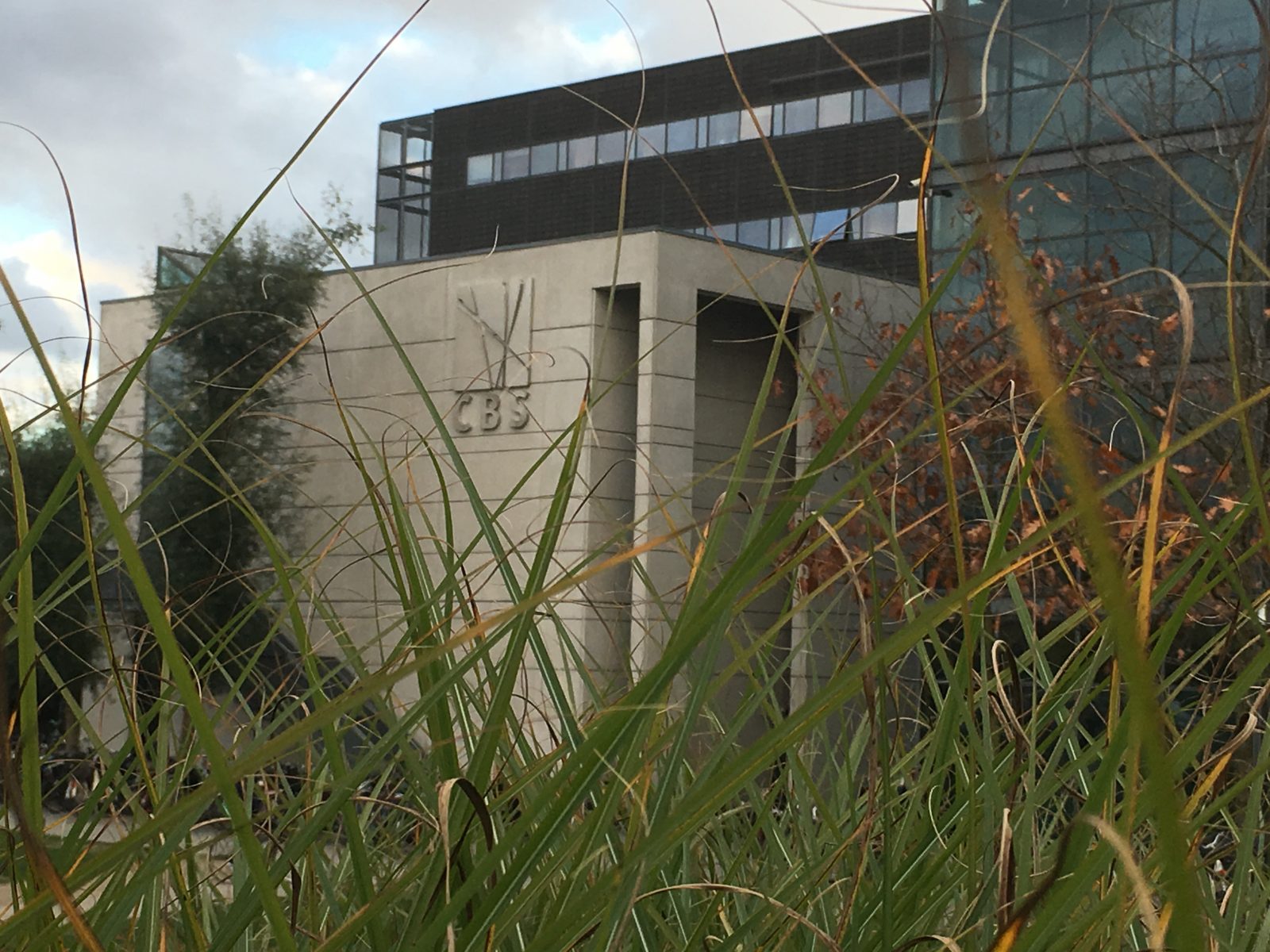
But still, according to Head of Estates Management, Nina E. Petersen, there is a long way to go before the goal is met.
“CBS hasn’t met the national goal in all areas. And CBS hasn’t met the goal of energy reduction. However, the figures don’t take students and our new building expansions the latter years into account. If you spread it out per student, there’s been a big reduction,” she says.
The initiatives made to reach the goal are, according to Lone Ryevad Boysen, good and important. But the work has to be more visible.
“All the different initiatives from around CBS are good and valuable. But they are scattered. The optimal solution is to anchor them somewhere in the organization or become part of a bigger plan. That plan doesn’t have to be made by the senior management, but rather through workshops and idea gathering from around campuses. Senior Management should then back it and make it valid for all of CBS, showing that this is something that is being prioritized,” she suggests.
In general, René Steffensen thinks an overall strategy will improve the work with sustainability at CBS, but it shouldn’t necessarily be handed out by the senior management.
“Everything shouldn’t be initiated by the senior management. But what I do think is that we could create some more awareness on the things we do in the name of sustainability. I don’t think students and staff onaverage know how much we do,” he says.
No criteria for success
When asking Kirsten Winther Jørgensen, the University Director of CBS, about why CBS hasn’t got an overall strategy on sustainability, she explains that sustainability is written into the overall strategies for CBS, Campus Services, and Campus Development.
“CBS has strategies and goals. Campus Services’ strategy from 2012 is still in force and has required immense investments, which have had a clear effect concerning water, heat, electricity, and waste sorting. Then there are the goals for new buildings,” says Kirsten Winther Jørgensen and goes on to explain the goals which focus on water usages, collection of rainwater, use of solar cells for the production of power, and CBS being a living lab with the gathering of sustainability data for use in research and teaching.
CBS has to consider what we can do in order to give the students the mindset needed to change the world
Louise Kofod Thomsen, CBS PRME
But there are no quantified goals or criteria for success in either of the strategies. Only written goals, which you can read in CBS PRME’s report from 2017 and in Campus Services strategy.
To the question, whether Senior Management is involved in making any overall plans for sustainability, Kirsten Winther Jørgensen explains:
“In my opinion, most assignments are better accomplished by specialists within the field than by me. In Campus Services, we have staff members who know way more about sustainability than I do. If we want to work with sustainability at CBS, we will have to ask the people who know the most about it, to work with it,” says Kirsten Winther Jørgensen and continues:
“This doesn’t mean that I don’t have a role to play in this. Together with the Campus Director and the Head of CBS Estates, I have made sustainability to be one of the four areas of focus in the new department of CBS Estates. Next, I will take part in discussing the overall objectives within the area when Campus Services has worked with it, and of course, I will help to pave the way for the implementation of the goals.”
Kirsten Winther Jørgensen is just like René Steffensen, aware that CBS will have to be better in communicating the work and results regarding sustainability.
“Overall, it is my opinion that CBS has been working strategically with sustainability for many years. But the results have had to speak for themselves. Therefore, it is become a demand for the coming strategic work that CBS becomes even better in communicating our goals,” she says.
CBS has to be the good example
It is not only Lone Ryevad Boysen, who asks for a sustainability strategy. Louise Kofod Thomsen, who works with responsibility and sustainability on a daily basis at CBS also finds it utterly important that CBS is more visible in what they do as a university to be sustainable.
“Many of the big companies, such as Novo Nordisk and Ørsted (former Donger Energy red.), have plans for sustainability, and since we deliver graduates and future leaders to the business society, we have to set a good example. CBS has to consider what we can do in order to give the students the mindset needed to change the world. For instance, by having trash cans for sorting everywhere,” says Louise Kofod Thomsen, who’s part of organizing an event later this month in which 60 students from Danish universities are asked to come up with sustainable solutions for a greener CBS campus.
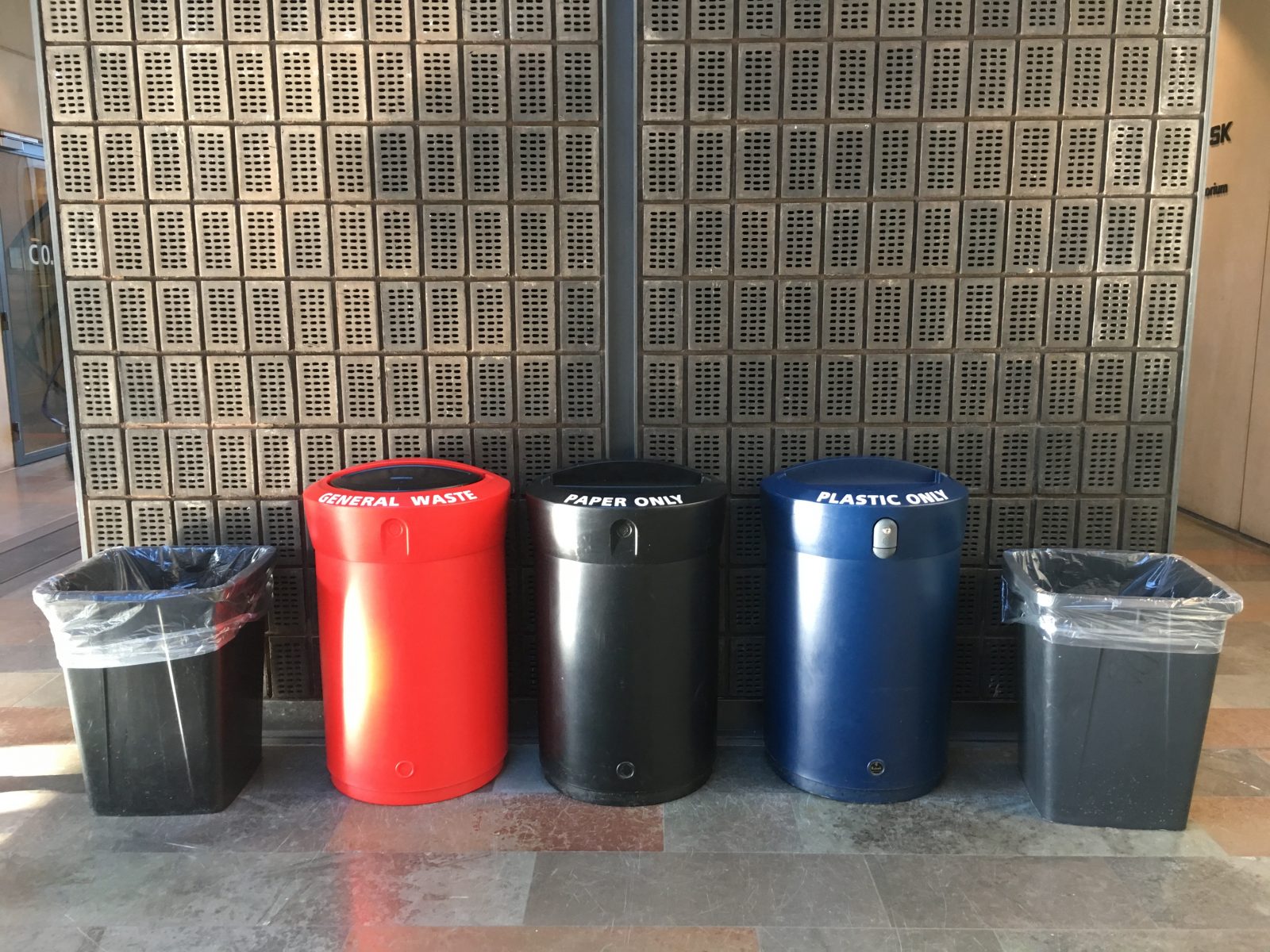
In CBS’ annual report from 2016, it is written that CBS’ ambition is “that responsible management education must be an integrated part of the core activities of CBS, both when it comes to research and education. At the same time, CBS wants to be a good example in our own organizational settings.”
But if CBS does not do more to present themselves as a good example, things could get messy, argues Lone Ryevad Boysen.
“The worst case scenario is that CBS gets accused of greenwashing. Saying that we, through our research and teaching, recommend doing a lot and want to statue a good example, but the truth is, we don’t. This just happened to H&M and it damaged their brand. I’m worried that the same could happen to CBS if we don’t act,” she says. (See fact box)
Visible sustainability
It is not that working with sustainability in a more corporate way is new to CBS.
In 2010, CBS established Green Campus. Until 2013, Green Campus published annual reports on sustainability and about how CBS was doing on various parameters. When Green Campus existed, CBS had signed themselves up to a 40 percent reduction in CO2 emission by 2020.
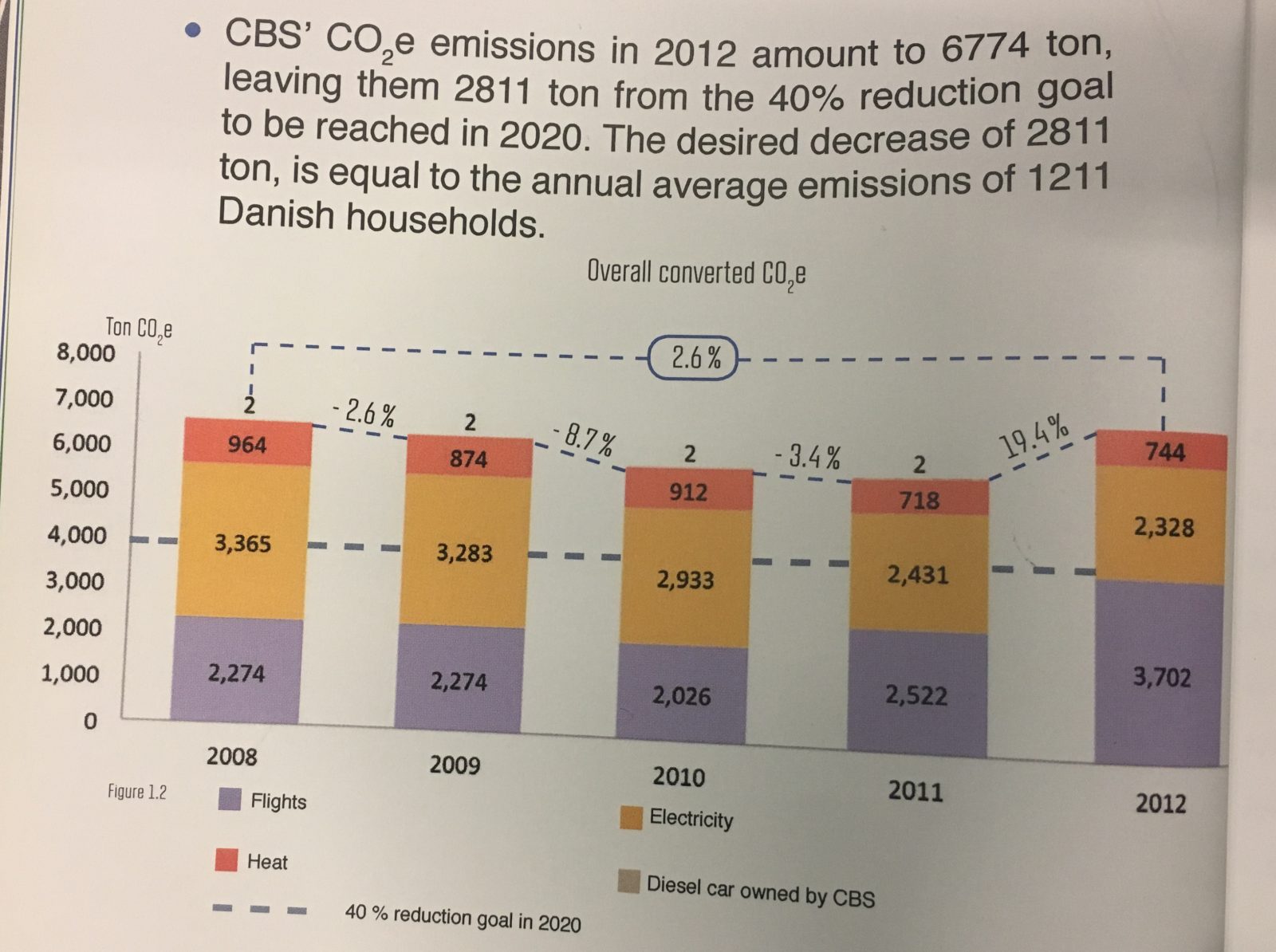
The people who ran Green Campus were highly engaged in the project. But as CBS ran into financial challenges, and the people working with it either quit or became busy with other things, the initiative was closed down in 2014 and the 40 percent goal was dropped.
This means CBS has not made annual reports on sustainability in regards to its campuses for four years. Because of this, it is difficult for staff and students to see how CBS is doing in the reduction of CO2 or energy consumption. The data does exist, but it is not put anywhere public or presented in an understandable way.
“The message regarding sustainability could be a lot more visible in many ways. Campus Services could put up posters about what they do for improving sustainability, but also encourage people to sort their waste, use less water, and remember to turn off the lights when they leave a room,” she says and argues that the students especially care a lot about sustainability and this should be one of the driving forces for CBS in their future work with sustainability.
“The students enrolled at CBS are representing a generation which already lives and thinks about sustainability, so, I think it’s quite easy to get people into making CBS more sustainable. The time is right.”



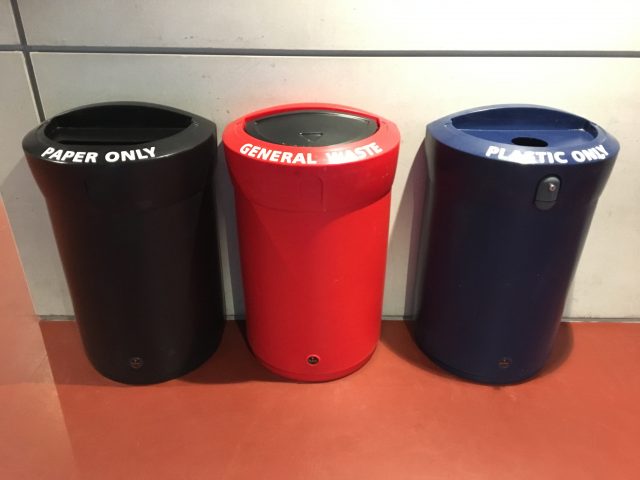
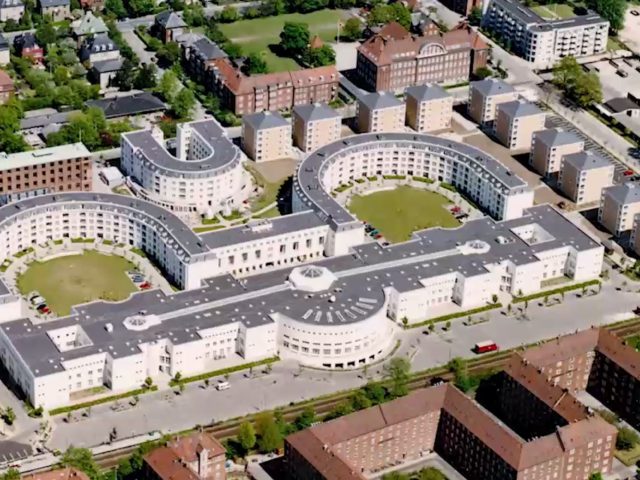
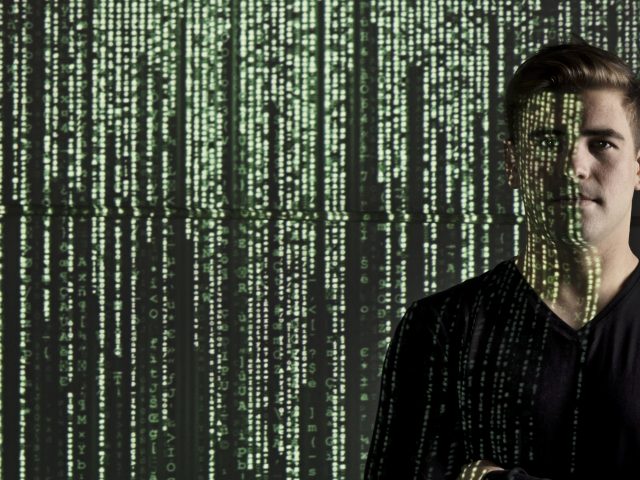




























































































































Comments